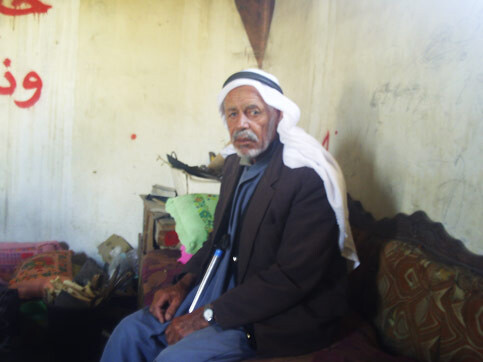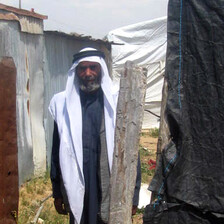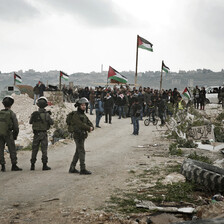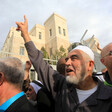Gaza Strip 18 May 2009

Suleiman Abu Jazzar in his home in the Brazil refugee camp in the Gaza Strip. (Rami Almeghari)
“Only if we return to our homeland, can there be peace. But as long as [Israel] keeps us refugees, we have no choice to resist them now and for generations to come, until we are back in Beir al-Saba,” said 75-year-old Suleiman Abu Jazzar in his home in the Brazil refugee camp in Rafah, southern Gaza Strip.
Along with more than 700,000 other Palestinians, Abu Jazzar was forced from historic Palestine by Zionist forces in 1948, a period referred to by Palestinians as the Nakba (catastrophe) and commemorated in mid-May while Israel celebrates its “Independence Day.” During 1947-48, Zionist paramilitary groups — which later formed the Israeli army — attacked and destroyed more than 450 Palestinian towns and villages. Abu Jazzar’s town of Beir al-Saba was given the Hebrew name of Beersheva by its conquerers.
Abu Jazzar and his family are amongst the more than 4.5 million registered Palestinian refugees living in camps in the Israeli-occupied West Bank and Gaza Strip, as well as in Jordan, Syria and Lebanon — unable to return to their land, though their right to return is enshrined in international law. There are millions of other Palestinians scattered around the globe comprising the Diaspora, a nation in exile.
“Prior to 1948, we used to live peacefully and happily in our hometown of Beer al-Saba. All out of a sudden, armed Jewish groups attacked the town and displaced my family including myself, as well as many other families,” recalled Abu Jazzar.
“In that period, we fled [to the outskirts of] Beir al-Saba, leaving behind us heaps of barley, our main harvest at that time. When night falls, I recall that myself and other youths of the town, used to sneak into these heaps to bring food for hungry children and women.
“After a while, the Jews began to spot us, and finally we were all displaced form the whole area, leading us to the Gaza Strip, where me and my family were settled in the Rafah area here,” Abu Jazzar said while laying on a sofa in a traditionally-decorated room.
Asked whether residents of Beir al-Saba resisted the Zionist forces, Abu Jazzar put much blame on the Arab countries and armies for the Palestinian refugees’ situation.
“There were no Israeli warplanes at that time, only tanks. Also, their numbers were not that big, but unfortunately we had no guns or weapons. I only recall that someone from the Barahma tribe had a gun. I really blame the Arab armies, which failed us. Their weapons were not that effective. These armies did not even train us how to fight; we were merely farmers and had nothing to do with armament. They are to be blamed for our plight.”
Abu Jazzar endured not only the 1948 dispossession, but he witnessed and survived other Israeli wars and conflicts that he described as more Nakbas for the Palestinian people.
“In 1956, the occupation forces invaded our towns here in Gaza, using tanks and armored vehicles. Also, in 1967, they invaded us again and continued to occupy us until recently. They are not leaving us, they don’t want us to live peacefully,” he said.
More recently, Israeli army launched a three-week comprehensive attack on the Gaza Strip, killing more than 1,400 Palestinians — the majority of them civilians. During this war, Abu Jazzar’s asbestos-roofed house was partially damaged, as Israeli forces destroyed many houses in his neighborhood.
“Only God saved us during the Gaza war, the [Israelis] only want to destroy us completely. I didn’t go anywhere during the war; my family and I remained at the house. Where to go? … In 1948, we left our house and left our farm lands, thinking we would return in a few days. But as you see, son, we are here for 61 years now, and who knows how long we will remain so?”
Umm Salah, Abu Jazzar’s 70-year-old wife, sang a Palestinian folk song about the events of 1948: “You have made us refugees. When we fled al-Ramla and Beir al-Saba, heading to Gaza, carrying our luggage on our shoulders, we wondered: what did you do for us, Ben Gurion [Israel’s first prime minister], you brought us a Nakba!”
Sighing deeply, she said that only God protects them, but she hopes for peace, nevertheless.
“It is true that they are more powerful than us, but where can we go — where? We just resist them by our steadfastness on this land, sticking to our homes,” Umm Salah said.
Both Abu Jazzar and Umm Salah said that they would refuse to take monetary compensation instead of a return to their town of origin. “Our history is there in Palestine,” they said together, “in Beir al-Saba. How could we sell our history?”
The now elderly refugees have evidently passed down their profound connection to their land to their 28-year-old daughter, Laila, who said with great emotion:
“What peace are they talking about? Every day they kill us, our families have lived the suffering for 61 years now. … If there is a truce, this truce cannot last, as they aim to destroy us completely. Look at the last Israeli war on us, they killed many people. We should keep steadfast, until we return to our hometown of Beir al-Saba. We can never accept any compensation, even if we all die one after another.”
Rami Almeghari is a journalist and university lecturer based in the Gaza Strip.





